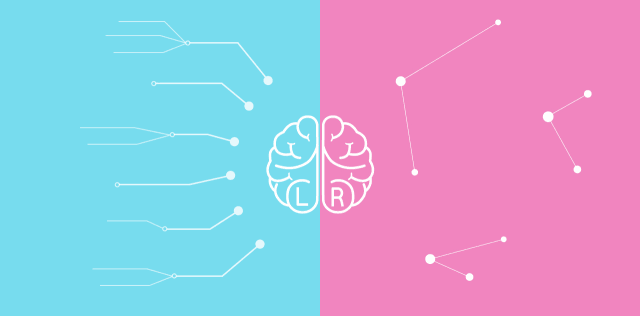相信学生时代的你一定有过这样的经历,面对一道毫无头绪、无从下笔的难题时定会选择“蒙”,抱着“大不了扣分,但万一蒙对了”的心理写下一个你认为正确的答案。总之这个被你pick的答案一定是靠着那妙不可言的缘分,那仿佛双胞胎般的心电感应,让你的眼神在这四个选项中锁定了它,想必这就是所谓的直觉了。当然生活中靠直觉的事情还有很多很多,我们对一件事情不能确定肯定的时候,最后做出的判断都是直觉来凑。那么这种奇妙的感觉又是从何而来?研究人员称虽然直觉不一定是正确的,但它是我们过去经验的集合,在某些情况会帮助我们做出正确的选择。下面就和本译一起揭开直觉的神秘面纱吧~
You decide not to ride mass transit and that's the day the train breaks down. You take a risk on a new job and it's the career of your dreams. Or even simpler, you make a right turn when you don't know where you're going because you just know that's the way home.
某天,你突然决定不乘坐火车出行了,结果常坐的那趟火车恰巧在那天出现了故障。你勇敢地去尝试一份新的工作,结果那就是你梦寐以求的职业。再举个简单点的例子,当你不知道往哪儿走的时候,你却右转了,因为你潜意识里知道这就是回家的方向。

These intuitions are "gut feelings" that we can't easily explain. They don't seem to be controlled by any sort of logic, but they often appear to be right. That's why you're often told to "trust your gut." And although it seems like trusting the lottery, scientists put some stock into the impact of those vague feelings.
这些就是所谓的难以解释的直觉。它们似乎不受任何逻辑的控制,但是却往往非常准确。这也就是为什么常常有人告诉你要相信自己的直觉。尽管这好像和相信彩票没什么两样,但是科学家却相信这些微弱感觉所产生的作用。
Tantam, who wrote about his research in the new book "The Interbrain," says all this subliminal information explains why laughter is infectious and also why it can be difficult to make eye contact with strangers on a busy train.
汤塔姆在他的新书《脑间联系》中提到了自己的研究。他认为,所有这些潜意识的信息都解释了为什么笑声具有感染力,为什么在拥挤的火车上很难和陌生人有眼神交流。

"We can know directly about other people’s emotions and what they are paying attention to," Tantam said. "It is based on the direct connection between our brains and other people’s and between their brain and ours. I call this the interbrain." The connection, he says, exists in the background, yet it's always there. We take it for granted unless our minds call it to the surface and then we credit it to some sort of instinct.
汤塔姆说:“我们能直接了解到别人的情绪,以及他们在关注什么。这是基于我们大脑和其余人的大脑能够互相产生直接联系的现象。我称其为脑间联系。”他认为,这种联系在背后起作用,并且一直存在。我们一直将其视为理所当然,直到有一天,大脑把它唤醒,然后我们称其为某种直觉。
01
A catalog of experiences
经验的集合

When you do something based on intuition, you're not just making a rash decision, you're calling upon your history of experiences, says Melody Wilding, a licensed therapist and professor of human behavior at Hunter College.
麦乐迪•威尔丁是一位有执照的治疗师,也是亨特学院人类行为学的教授。他认为,当你基于直觉做出某件事时,你并不是做了一个草率的决断,而是在召唤你过去的经验。
"Your gut is this collection of heuristic shortcuts. It’s this unconscious-conscious learned experience center that you can draw on from your years of being alive," Wilding said. "It holds insights that aren’t immediately available to your conscious mind right now, but they’re all things that you’ve learned and felt. In the moment, we might not be readily able to access specific information, but our gut has it at the ready."
威尔丁说:“你的直觉是一系列启发所产生的快捷式经验的集合。你可以从目前的生活经历里借鉴这个潜意识的经验学习集合。这个集合里含有对未来的洞察,虽然它们无法立刻对你的意识心理产生作用,但是这些事情你已经都学习和感受过了。有一天,我们可能无法处理特定的信息,这时我们的直觉就准备就绪,开始发挥它的作用了。”
So when you're trusting your gut, you're actually trusting this collection of subconscious experiences. Sometimes you have to free your mind to listen to those insights.
所以,当你相信自己的直觉时,实际上是在相信这种潜意识经验的集合。有时,你需要放松自己的头脑,去聆听那些直觉的声音。
Emotions play a part
情感起作用
02

When the brain's calls upon its stored files of memories and knowledge, it's not just this scan of history that comprises a gut instinct. Emotional heft also plays a key role. If you experience something during a heightened emotional period — when you're afraid or excited, for example — you are more likely to remember that event in detail.
当大脑召唤出已有的记忆和知识时,不只是这种对于过去记忆的回顾才产生了所谓的直觉。情感在其中也起到了重要的作用。如果你在情绪激动时(比如害怕或者兴奋)经历了某件事,你更有可能详细地记住这件事。
We store experiences in our brains as a combination of facts and emotions. When a new event recalls a past event, it doesn't just trigger a subconscious reminder of what happened, but it also stirs up the feelings you had at the time.
我们将事实和情感作为经验储存在大脑中。当一件新事物唤起我们对于过去事件的记忆时,它不仅帮助我们想起过去发生的事情,而且唤起了当时所产生的情感。
For example, if you meet someone new who reminds you of a loved one, you may also feel the same warm emotions you have toward the person in your past. And your gut instinct makes you like this new person.
比如,如果你遇到某位新人,他/她让你想起曾经爱过的某个人,这时你可能从这位新人身上感受到和过去那个人同样的温暖。然后,你的直觉会让你喜欢上这位新人。
03
Your gut's not always right
你的直觉并不总是正确

Just because your "gut" draws on all these past events and experiences, doesn't mean its instincts are always right. Los Angeles-based intuitive psychiatrist Judith Orloff believes there are benefits to listening to your instincts.
虽然你的直觉能够利用过去的经验和事件,但是它并不总是正确的。洛杉矶的直觉精神病学家朱迪斯•奥罗夫认为,聆听直觉大有裨益。
“Living more intuitively demands that you’re in the moment," Orloff said, "and that makes for a more passionate life." But sometimes the right brain can trigger suspicions of things or people that are unfamiliar or offer unwarranted feelings of familiarity just because a person or situation reminds you of something else.
奥洛夫说:“按照直觉生活可以使我们的生命更加富有激情。如果想要这种生活方式,那你需要保持状态在线。”但是有时,右脑会怀疑我们不熟悉的人或事,或者仅仅因为一个人或者某种情境唤起了某件事,右脑也会对这种熟悉产生没有根据的感觉。
So how do you know when to trust your gut? Orloff says it’s a matter of "combining the linear mind and intuition," and finding the right balance between gut instinct and rational thinking. When you've had a gut instinct, then turn on your rational mind and figure out the best course of action to take.
那么,你如何知道什么时候去信任自己的直觉呢?奥洛夫认为,关键在于“将线性思维和直觉相结合”,并且在直觉和理智之间寻找到一个平衡。当产生某种直觉时,你需要用理智思考然后判断出最佳的做法。
Trust your gut. But fact-check with your brain.
相信你的直觉。但是,别忘了也要用理智来核实。
|
|
 /1
/1 